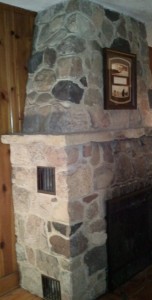When we were kids, we used to sing a Sunday school song straight out of Matthew 7: “The wise man built his house upon the rock, and the rains came tumblin’ down.”
 I always liked singing the 2nd verse better than the 1st, because it gave us a chance to make a loud noise: “The foolish man built his house upon the sand… The rains came down, and the floods came up, and the house on the sand went SMASH!”
I always liked singing the 2nd verse better than the 1st, because it gave us a chance to make a loud noise: “The foolish man built his house upon the sand… The rains came down, and the floods came up, and the house on the sand went SMASH!”
The song quoted a teaching of Jesus when he used two word pictures taken from his listeners’ common experience. Anyone who’d ever built a house would have understood his analogy: rock makes a better foundation than sand, any day. Then Jesus introduced himself as the Rock.
I love rocks. My basement shelves are full of them, each one picked up along Lake Michigan’s shoreline and appreciated for its beauty. If I could build a house of those stones, I would. They speak to God’s vast creativity and are a powerful testimony of the remarkable earth he made.
Today at church I was challenged by Pastor Lindsay’s insightful sermon about stones, rocks, bricks and the church. Back at home, I found myself standing in front of our old stone fireplace, put together in 1938. The odd-shaped pieces, fashioned with chisel and hammer, had been fit together in a way that lets it rise through two stories and a roof, and reach even farther as a chimney. None of it has moved a smidgen in 74 years.
I can’t imagine the weight resting on those bottom stones, yet because they’re rocks, they’ve had no trouble holding up the whole structure. I thought of the shifting sands down at the beach today, continually changing shape in the wind, and the Sunday school chorus made perfect sense. Rock trumps sand for foundation purposes.
As I studied my fireplace, I thought of something our pastor said. Sand, when fused together, can be made into bricks, which can then be combined to build giant cathedrals. The unstable can become stable. After all, when inspected under a magnifying glass, sand is simply tiny rocks.
Christianity is all about many people becoming one family, one Church, and the unstable (sand) becoming stable (bricks). Every individual who loves and follows Christ is unified (and stabilized) through Jesus, who is called the cornerstone, the most important rock in any building. My father was an engineer/architect and used to tell us the cornerstone was insurance that the rest of the building would be “square with the world.”
And isn’t that exactly what Jesus did? He laid his life down and became the foundation, the cornerstone, on which the Church was built. Then he offered to change the rest of us from sand into sturdy bricks who together can build lives on him.
And when the storms come against his Church, against us, “The house on the Rock will stand firm!”
“You… are being built together to become a dwelling in which God lives by his Spirit.” (Ephesians 2:22)


Your words are beautifully illustrated. I’m hunting for the Scripture that states, “the rocks will cry out.” Do you know the reference?
Margaret, you never cease to amaze me with your articulation of God’s Word – expressed through our lives and vice-versa. It truly is a gift. I lLOVE rocks also…..when visiting the mountains, especially, the variance of color, patterns, size, etc….and those found on the beach…if listened to…speak volumes untold……what an adventure they have. thanks for such a wonderful blog.